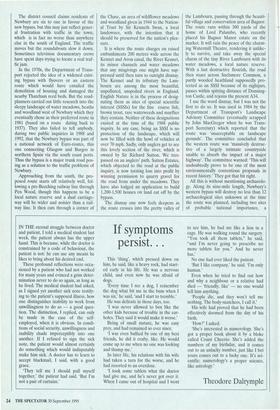If symptoms
persist. . .
IN THE eternal struggle between doctor and patient, I told a medical student last week, the patient always has the upper hand. This is because, while the doctor is constrained by a code of behaviour, the patient is not: he can use any means he likes to bring about his desired end.
These profound reflections were occa- sioned by a patient who had not worked for many years and evinced a grim deter- mination never to do so again, as long as he lived. The medical student had asked, as I signed yet another sick note testify- ing to the patient's supposed illness, how one distinguishes inability to work from unwillingness to do so — a good ques- tion. The distinction, I replied, can only be made in the case of the self- employed, when it is obvious. In condi- tions of social security, unwillingness and inability shade imperceptibly into one another. If I refused to sign the sick note, the patient would almost certainly do something which would indisputably make him sick. A doctor has to learn to accept blackmail, I said, with a good grace.
`They tell me I should pull myself together,' the patient had said. 'But I'm not a pair of curtains.' This 'thing', which pressed down on him, he said, like a heavy rock, had start- ed early in his life. He was a nervous child, and even now he was afraid of dogs.
`Every time I see a dog, I remember the dog what bit me in the bum when I was six,' he said, 'and I start to tremble.'
He was delicate in those days, too.
`I was never allowed to box like the other kids because of trouble in the ear- holes. They said it would make it worse.'
Being of small stature, he was easy prey, and had remained so ever since.
`I was even bullied by one of my best friends, he did it crafty, like. He would come up to me when no one was looking and thump me.'
In later life, his relations with his wife had taken a turn for the worse, and he had resorted to an overdose.
'I took some tablets what the doctor had give me, and he's never got over it. When I came out of hospital and I went to see him, he had me like a lion in a cage. He was walking round the surgery. "You took all them tablets," he said, "and I'm never going to prescribe no more tablets for you." And he never has.'
No one had ever liked the patient.
`But I like company,' he said, `I'm only human.'
Even when he tried to find out how and why a neighbour or a relative had died — 'friendly, like' — no one would tell him anything.
`People die, and they won't tell me nothing. The body-snatchers, I call it.'
His wife had proved that he had been effectively doomed from the day of his birth.
`How?' I asked.
`She's interested in numerology. She's got a proper book about it by a bloke called Count Cheerio. She's added the numbers of my birthday, and it comes out to an unlucky number, just like I bet yours comes out to a lucky one. It's sci- entific: numerology's a proper science, like astrology.'
Theodore Dalrymple


































































 Previous page
Previous page